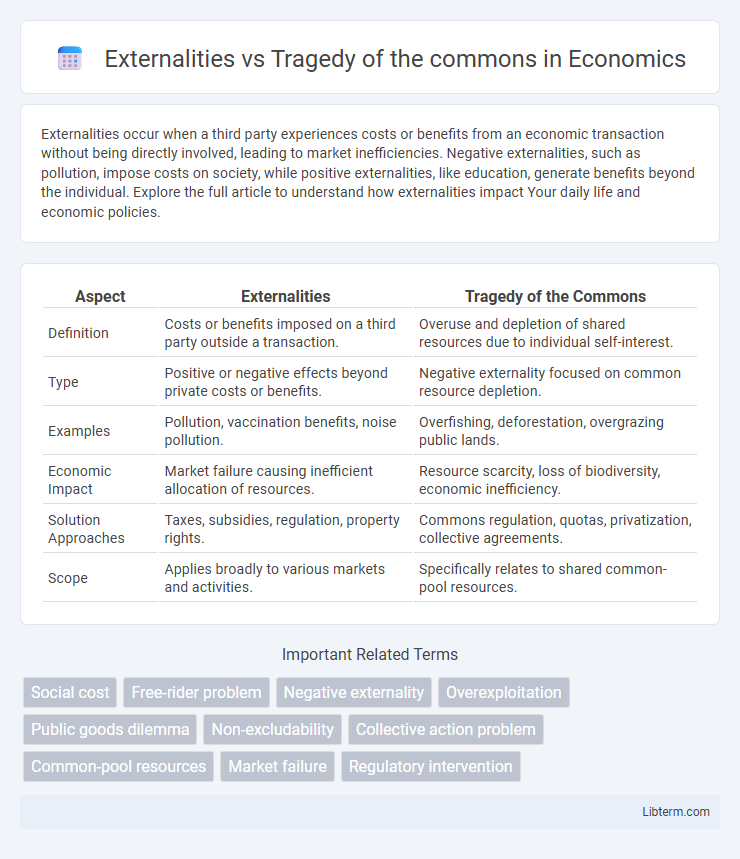Externalities occur when a third party experiences costs or benefits from an economic transaction without being directly involved, leading to market inefficiencies. Negative externalities, such as pollution, impose costs on society, while positive externalities, like education, generate benefits beyond the individual. Explore the full article to understand how externalities impact Your daily life and economic policies.
Table of Comparison
| Aspect | Externalities | Tragedy of the Commons |
|---|---|---|
| Definition | Costs or benefits imposed on a third party outside a transaction. | Overuse and depletion of shared resources due to individual self-interest. |
| Type | Positive or negative effects beyond private costs or benefits. | Negative externality focused on common resource depletion. |
| Examples | Pollution, vaccination benefits, noise pollution. | Overfishing, deforestation, overgrazing public lands. |
| Economic Impact | Market failure causing inefficient allocation of resources. | Resource scarcity, loss of biodiversity, economic inefficiency. |
| Solution Approaches | Taxes, subsidies, regulation, property rights. | Commons regulation, quotas, privatization, collective agreements. |
| Scope | Applies broadly to various markets and activities. | Specifically relates to shared common-pool resources. |
Understanding Externalities: Definition and Types
Externalities occur when a third party experiences unintended costs or benefits from an economic transaction, with common types including positive externalities like education and negative externalities such as pollution. These spillover effects lead to market inefficiencies because the full social costs or benefits are not reflected in market prices. Understanding externalities is crucial for addressing environmental challenges and resource management, which contrasts with the tragedy of the commons focusing on resource depletion due to individual overuse.
The Tragedy of the Commons Explained
The Tragedy of the Commons describes a situation where individual users, acting independently according to their own self-interest, deplete or spoil shared resources, leading to long-term collective loss. This concept contrasts with externalities, which refer to value costs or benefits incurred by third parties not directly involved in an economic transaction. Understanding the Tragedy of the Commons highlights the necessity for regulation or collective management to prevent resource overuse and ensure sustainable outcomes.
Key Differences Between Externalities and Tragedy of the Commons
Externalities refer to the positive or negative effects of a transaction experienced by third parties outside the market, impacting social welfare without direct compensation. The tragedy of the commons arises from individual users overexploiting shared, limited resources, leading to depletion or degradation due to lack of exclusive ownership or regulation. Key differences include that externalities encompass a broader range of spillover effects beyond resource use, whereas the tragedy of the commons specifically addresses common-pool resource management failures caused by individual incentives conflicting with collective interests.
Real-World Examples of Externalities
Externalities arise when a third party experiences unintended consequences from economic activities, such as pollution from factories affecting local communities or noise disturbances from airports impacting nearby residents. Unlike the tragedy of the commons, which involves the overuse of shared resources like overfishing in international waters or deforestation in public lands, externalities can be positive or negative, influencing market outcomes without direct shared ownership. Real-world examples include carbon emissions contributing to climate change and immunization programs creating herd immunity, both demonstrating how costs or benefits extend beyond private transactions.
Real-World Cases of the Tragedy of the Commons
The tragedy of the commons occurs when individuals overexploit shared resources, such as overfishing in the Atlantic Ocean leading to collapsed fish stocks and diminished biodiversity. Urban air pollution in cities like Beijing exemplifies how unregulated emissions create negative externalities that degrade communal health and environment. Deforestation in the Amazon rainforest demonstrates the long-term consequences of collective resource mismanagement impacting global carbon cycles and indigenous livelihoods.
Economic Impacts of Externalities
Economic impacts of externalities result in market inefficiencies, where costs or benefits are not reflected in market prices, leading to overproduction or underconsumption of goods and services. Negative externalities, such as pollution, impose social costs that reduce overall welfare and require government intervention through taxes or regulations to correct. Positive externalities, like education, generate benefits beyond the individual, necessitating subsidies or public investment to enhance economic growth and social well-being.
Environmental Consequences of the Tragedy of the Commons
Environmental consequences of the Tragedy of the Commons include overexploitation of shared natural resources, leading to resource depletion and ecosystem degradation. Common examples involve deforestation, overfishing, and pollution, resulting in loss of biodiversity and reduced ecosystem services. Unlike externalities, which are unintended side effects affecting third parties, the Tragedy of the Commons arises from individual rational actions collectively causing environmental harm.
Policy Responses to Externalities
Policy responses to externalities often involve regulations, taxes, or subsidies to align private costs or benefits with social costs or benefits, addressing market failures effectively. Tradable permits and Pigovian taxes are common tools used to internalize negative externalities, incentivizing firms to reduce harmful emissions or pollution. Governments may also encourage positive externalities through subsidies for education or healthcare, ensuring broader societal benefits beyond individual gains.
Strategies to Prevent the Tragedy of the Commons
Strategies to prevent the Tragedy of the Commons include implementing regulatory policies such as quotas and permits to limit resource overuse, establishing property rights to incentivize sustainable management, and encouraging community-based management systems that align individual incentives with collective welfare. Economic tools like Pigouvian taxes internalize external costs, promoting more efficient resource use by making users bear the environmental damage they cause. Effective prevention also relies on transparent monitoring, enforcement mechanisms, and fostering cooperation among stakeholders to balance private interests with public goods conservation.
Integrating Solutions: Managing Shared Resources and External Effects
Effective management of shared resources requires addressing both externalities and the tragedy of the commons by integrating regulatory frameworks and market-based incentives. Implementing property rights, usage quotas, or tradable permits internalizes external costs and promotes sustainable resource utilization. Collaborative governance involving stakeholders enhances monitoring and enforcement, ensuring long-term preservation of common-pool resources while mitigating negative external effects.
Externalities Infographic

 libterm.com
libterm.com